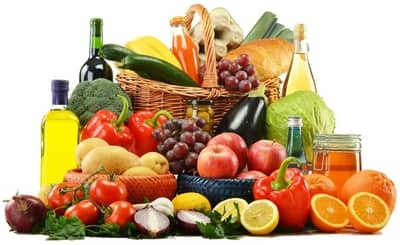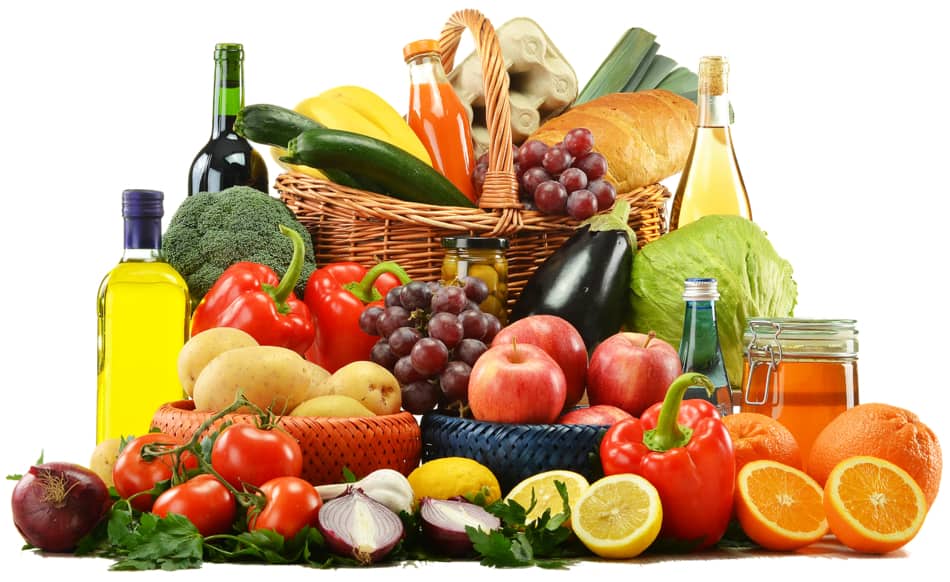
When it comes to nutrition, there is so much misinformation out there that it’s hard to know what to trust. It has gotten to the point that I hear many people complain, “if we just had less misinformation about nutrition, the public would be less confused.”
But then I look into the work of the critics and they’re spreading just as much misinformation as the people they’re criticizing!
So what makes me any different from any of these folks?
Well, I have devoted this website to take a look at the actual science – not just one or two studies to further support my current beliefs, but the aggregate of research.
No, I am not a scientist, but I have no particular bias; I simply want to eat in a way that will maximize my health.
The issue with most “coaches” or “experts” is that they will sell you on fat loss by simply having you stay within a specific calorie limit.
As long as you stay within that limit, regardless of what you’re eating, you will likely lose weight (if that is your goal) and you will look better.
But is that what nutrition should be about? If you think so, that’s fine, but that’s not what I believe.
My philosophy is to focus on maximizing health, not just providing a calorie limit so that you can lose weight eating food that’s not very healthy. When you focus on eating for health, in most circumstances, you will find yourself automatically maintaining an ideal weight.
Eating for health means identifying the most nutritious foods that you can put in your body. So what are those foods?
In general, there is overwhelming evidence to suggest that a plant-based diet centered around whole foods is most optimal for human health.
In this article, you’ll find out why. While I reference a fair amount of research, I will not get into too much detail; there is way too much to cover in one article. Instead, I am going to give an overview as to why I recommend eating a plant-based diet in order to prevent disease and live a long, healthy life.
What Diet Do The Healthiest People In The World Eat?
Before we get into the medical research, it might be informative to ask what type of diet the healthiest humans eat. For the answer to this question, let’s look at what are called “the Blue Zones.”
“Blue Zones” are specific regions in the world where entire populations live uniquely long, healthy lives. These are the areas of the world with the highest number of centenarians (people who live to and past the age of 100!). While there are multiple factors that contribute to their exceptional health and longevity, one thing they share in common is that they eat a predominantly whole foods plant-based diet.

Now, this way of eating is not an all or nothing phenomenon; in fact, there is good reason to believe that any increase in your consumption of whole plant-based foods can improve your health.
Now let’s get into some of the science of nutrition.
All Cause Mortality
I think there is no better place to find data on how different patterns of eating affect health than to consider “all cause mortality”, a term used to refer to a death from any cause.
A 2016 study investigated the relationship between animal and plant protein intake and all cause mortality by looking at the diets of 85,013 women and 46,329 men.
The study found that there was a positive correlation between higher animal protein intake and all cause mortality. The consumption of plant protein, on the other hand, was inversely related to all cause mortality, especially among people who had at least one health risk factor.
These findings indicate that substituting animal protein, especially from processed red meat, with plant protein is associated with lower mortality rates.
This statement is supported by a number of other studies. For example, one study showed that compared to a purely plant-based diet, simply eating half a serving of processed meat per day was associated with a 13% higher mortality rate, with red meat increasing risk by 9%.
Similar findings are seen in countless studies, such as this meta-analysis.
If that doesn’t convince you to start eating more plant-based foods, then I don’t know what will! Just kidding – we haven’t even scratched the surface yet.
Let’s get into this next section as it demonstrates the power of a plant-based diet.
Heart Disease
With more Americans dying from heart disease than any other disease, I think it is important to consider how diet affects heart health. What we find is astonishing.
Dr. Caldwell Esselstyn conducted a study that was published in 2014 looking at how switching to a plant-based diet would affect Coronary Artery Disease (CAD), the most common type of heart disease that often leads to heart attacks.
He took 198 people with severe CAD and counseled them in plant-based nutrition. Of the 198 original participants, 177 subjects adhered to the study guidelines, meaning they eliminated dairy, fish, and meat, in addition to eliminating added oil.
These participants were followed for an average of 3.7 years and the outcomes were extraordinary. The participants who adhered to the plant-based diet saw a drastic reduction in recurrent Coronary Artery Disease symptoms compared to the participants who dropped out.
Of the 177 participants who stayed with the plant based diet, one participant had a stroke during his time being followed; there were no heart attacks.
In contrast, of the 21 participants who did not adhere to the plant based diet, 62% experienced an adverse cardiac event.
These statistics are striking, and offer a significant amount of hope. However, what may be even more impressive is this following image.
The top image in Figure 1 on the left shows the perfusion of blood in the myocardium, which is the muscle tissue of the heart. As you can see, there is insufficient blood flow (this is what the arrow is pointing out). The bottom image displays the restoration of blood flow in the myocardium – after just 3 weeks of plant-based nutrition! In other words, blood can now flow through the blood vessel properly because the plant-based diet reversed the blockage of the vessel that had prevented blood flow.
Figure 2 below displays the reversal of Coronary Artery Disease, with the left image showing a diseased artery. After 32 months on a plant-based diet, this artery regained its normal configuration, without cholesterol-lowering medication. In other words, the plant-based diet reversed the symptoms of Coronary Artery Disease and healed the artery through the power of healthy nutrition.
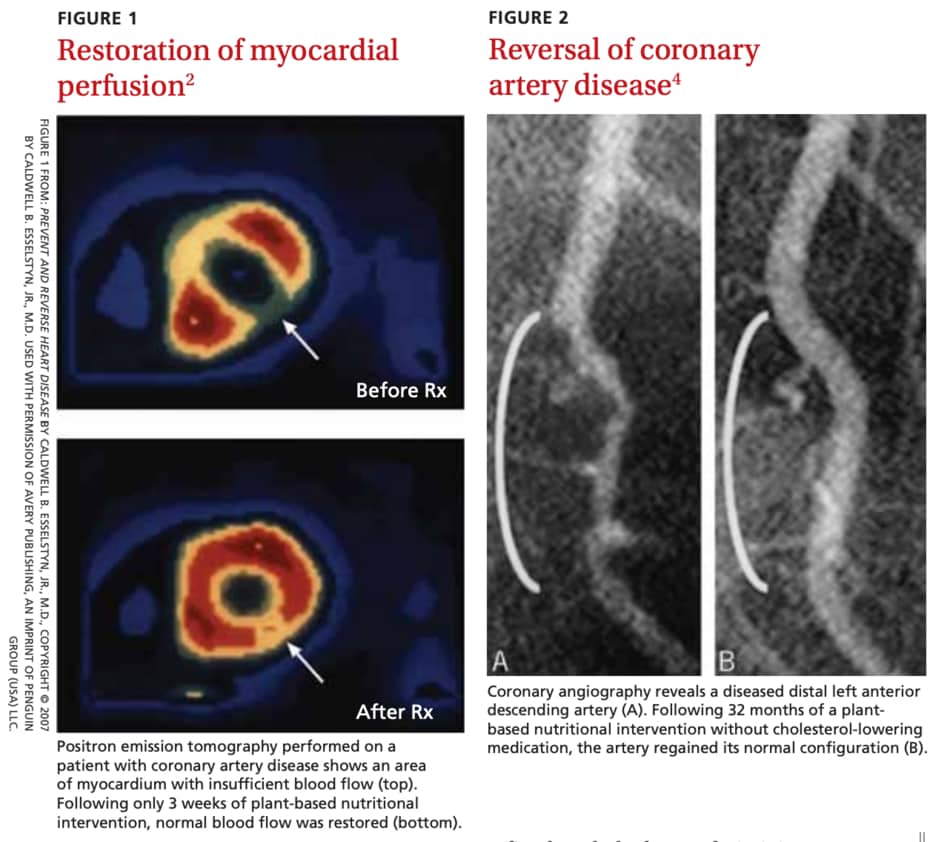
These images are extraordinary because not only do they display how a plant-based diet can reduce the risk of heart disease, but they also suggest that it is never too late to make changes to your diet because symptoms of CAD, such as restricted blood flow, can be reversed in a matter of a few weeks!
I don’t know about you, but I think that’s incredible.
Cholesterol
High cholesterol is quite common in people who live in the United States and can greatly contribute to someone’s risk of getting heart disease. While there is a genetic component to an individual’s baseline blood cholesterol levels, diet does significantly contribute to overall cholesterol levels.
Someone with high cholesterol will often develop fatty deposits in their blood vessels. Over time, these deposits will grow and lead to the restriction of blood flow through the arteries (as we saw in the image above). Ultimately this can lead to a heart attack or stroke.
As you can see from this study, the table below demonstrates that vegans (individuals who eat no animal products) have the lowest levels (by a substantial amount) of both total cholesterol and LDL (bad) cholesterol compared to both vegetarians and omnivores.
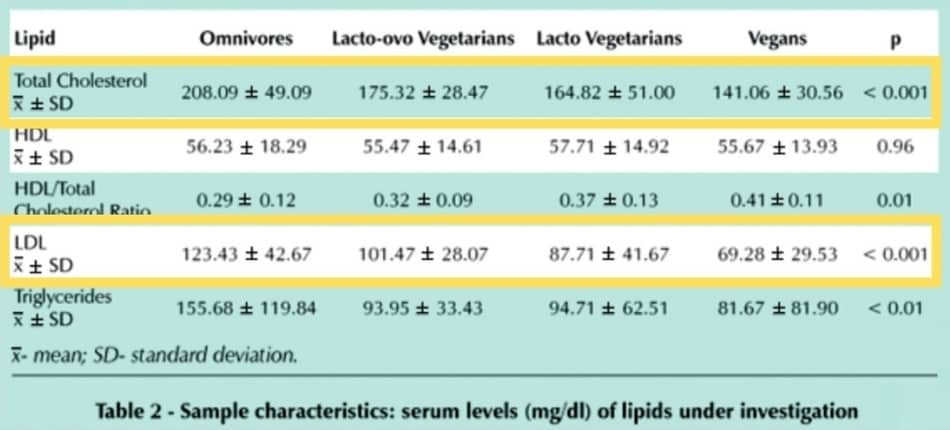
The reason for this is that cholesterol levels in your blood can be impacted by both dietary cholesterol and saturated fat, among other factors. Animal products are the only foods that contain cholesterol – plant foods contain 0 cholesterol. Additionally, animal products contain a significant amount of saturated fat, while plant foods, with the exception of a few foods, contain very little amounts of saturated fat.
There is too much to discuss about this topic now so I will write about this in more detail in a future article.
Blood Pressure
Based on the previous data about cholesterol, it’s not hard to imagine that diet can affect blood pressure as well. After all, if fatty deposits accumulate in blood vessels and make it more challenging for blood to flow to and from the heart, (again, as we saw in that image above), the heart will need to work harder in order to ensure proper blood flow.
This is partly why we see, according to this study, that vegans having a 75% risk reduction in hypertension (high blood pressure) and vegetarians having a 55% risk reduction compared to non-vegetarians.
This is not to say that people who eat animal products all have high blood pressure, and that people who eat no animal products have low blood pressure; but in general, vegans do have significantly lower blood pressure compared to non-vegans.
Cancer
This is another topic that requires a more lengthy discussion, but for the sake of this article, I will keep it brief. In general, there is evidence that people eating plant-based diets have a lower risk of developing cancer.
This meta-analysis of 96 studies showed that vegans have a 15% decreased risk from all types of cancer and vegetarians have an 8% reduced risk, indicating a “significant protective effect” for vegans and vegetarians when it comes to cancer.
In this famous study by Colin Campbell, rats who were exposed to a carcinogen were then fed either a high protein diet or a low protein diet in order to see how the cancer cells responded. Campbell found that he was able to effectively “turn on or off” cancer growth depending on the type of diet. When he fed rats a high protein diet, which is associated with meat and dairy, the cancer cells were “turned on”; the opposite was true when the rats were fed a low protein diet, which is associated with plant-based foods.
Now obviously rats are not humans and strictly relying on animal studies to reach conclusions about human health is not optimal. However, these conclusions align with a robust literature suggesting that cancer rates (as well as heart disease and other diseases) are lower in people who eat primarily a plant-based diet.
In fact, given the extensive research suggesting the detrimental impact of red and processed meat, the World Health Organization has classified processed meats as a group one carcinogen, meaning they can definitely contribute to cancer in humans. Similarly, red meat is classified as a group 2 carcinogen, meaning it probably causes cancer.
In light of these findings, it should not be surprising (which I find quite interesting) that research also shows plant foods to contain an average of 64 times more antioxidants than animal foods.
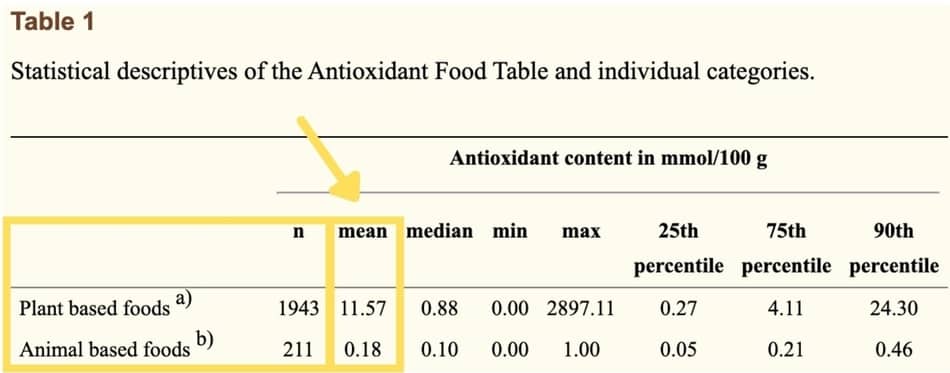
In the most simple terms, antioxidants are important because they prevent damage to cells, which has been linked to many diseases.
Type 2 Diabetes
Type 2 diabetes, a condition largely caused by lifestyle, dramatically increases the risk of various cardiovascular issues, in addition to other chronic diseases.
The foods you eat on a daily basis have a significant impact on your chances of developing, or managing, type 2 diabetes. For example, this study shows that the risk reduction of diabetes for vegetarians varies between 38% and 61% and 47% to 78% for vegans compared to non-vegetarian/vegan individuals.
Since we know that being overweight or obese significantly increases your risk of developing type 2 diabetes, maintaining a normal body weight is important in order to prevent or even reverse type 2 diabetes.
People who eat a whole foods plant-based diet in general have lower BMIs compared to people who don’t. In fact, if you eat a diet mostly centered around whole, plant-based foods, it is actually fairly simple to maintain a healthy body weight.
This study by Dr. John McDougall put participants on a purely plant-based diet for only 7 days. Despite allowing participants to eat as much food as they desired, the median weight loss was over 3 pounds – impressive given the short amount of time!
I should point out that the median decrease in total cholesterol for participants in this study was 22, systolic blood pressure decreased by a median of 8 mm Hg, and diastolic blood pressure decreased by a median of 4.
Similarly, this 2017 study was a 12 week randomized control trial involving overweight and obese participants with at least one of chronic condition, such as hypertension, high cholesterol, heart disease, etc.
At the end of the 3 months, the participants who were informed about eating a plant-based diet, despite being able to eat as much food as they wanted, lost an average of 18.92 pounds.
Conclusion
If you take one thing from this article, let it be this: Eat more plants – fruits, vegetables, legumes, grains, nuts, and seeds.
While some of the research presented in this article accounts for people on a 100% vegan diet, you can start incorporating more plant foods into your diet even if you choose not to eliminate all animal products.
Any increase in the amount of plants in your diet will have benefits – it does not need to be an all or nothing phenomenon.
I will write more about this in the future, but if you need practical steps to include more plant-based foods in your diet, start with eating at least 1-2 servings of vegetables at both lunch and dinner and eating at least 2-3 servings of fruit per day.
That’s all for this article. If you have any questions or comments, feel free to leave them below and I will be sure to get back to you. I will be posting more articles on nutrition in the near future so stay tuned!

